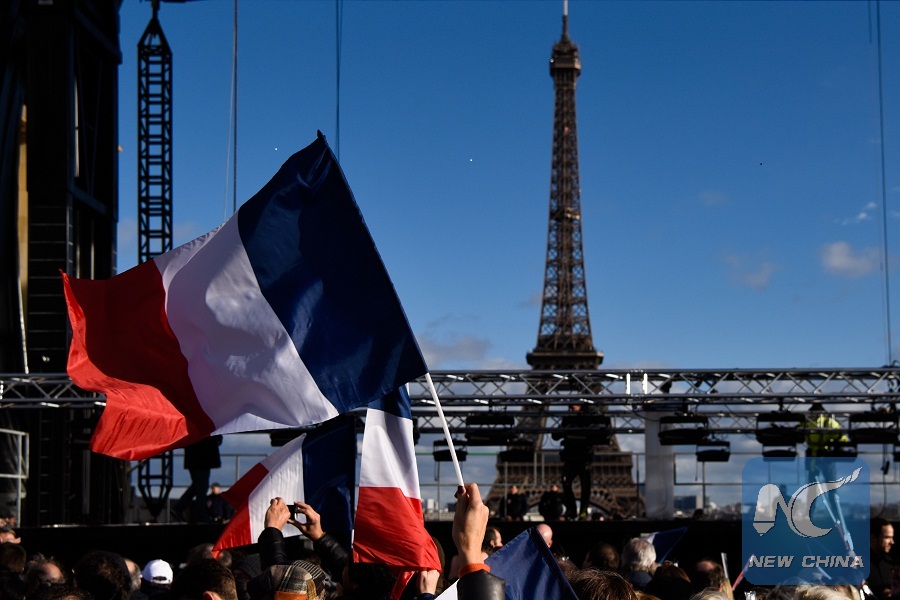
Flags are seen during a campaign rally of presidential candidate Francois Fillon at the Trocadero square in Paris, France, on March 5, 2017. (Xinhua/Chen Yichen)
ROME, April 29 (Xinhua) -- The first round of the French presidential election unveiled two antithetical visions of France, and of its role within Europe, according to an Italian analyst.
Besides the collapse of the traditional political parties -- especially center-left Socialists and center-right Republicans -- the contraposition between two opposite political visions was a key element emerging from the vote, according to Antonio Villafranca, head of Europe Program with Italy's Institute for International Political Studies.
"The two candidates who have reached the run-off have two antithetical perspectives of the European Union (EU), and of the role of France within the EU," he told Xinhua in an interview.
The first round, held last Sunday, saw centrist, independent candidate Emmanuel Macron prevail with 24.01 percent of the vote, followed by far-right candidate Marine Le Pen with 21.3 percent.
"Macron's vision is absolutely pro-Europe," Villafranca said. The centrist contender would push for a stronger EU, calling for further integration in the field of European defense and among members of the euro-zone, which would entail an overall revamp of the European process.
Macron would see France's role being entirely played within these boundaries, according to the analyst.
On the other hand, Le Pen proposed an opposing vision, mostly based on protectionism and on the "French first" principle.
"This perspective is much more in line with that of U.S. president Donald Trump," Villafranca said.
In her first address after results of the first round were clear, she cited former president Charles De Gaulle, and that was not by chance, according to the analyst.
"She did so because her main challenge now is to be accredited as a candidate of the right, and not of the far-right," Villafranca said.
"In the closing days of her campaign, Le Pen has also softened her anti-European slogans, and talked less of European issues."
Nonetheless, her vision of France's role, said Villafranca, would imply at least negotiating with the EU -- if not confronting it -- in order for the national government to regain certain powers, beginning with the control of the national borders.
The analyst suggested another element was strongly emerging from the French presidential contest: the weakening of the traditional "left-right" political divide.
"In Macron's program, we find proposals typically belonging to a leftist vision, such as the idea of extending unemployment benefits to workers who currently do not qualify for them," Villafranca said.
At the same time, he would agree to make France's hiring and firing rules even more flexible, and to overhaul the 35-hour working week measure, which are ideas more fit for a center-right force, he said.
"The same happens with Le Pen, who does not represent solely the far-right sentiment, as it had been with her father Jean-Marie instead," Villafranca added.
Finally, although all polls so far suggest Macron would have more chances of winning the run off, the analyst warned it was still too early to say what "message" French citizens would send to the EU.
"Precisely because these two candidates are so antithetical, and separated only by a few points. We do have to wait the second round to determine what feelings will prevail, and what signal France is going to send to Europe," he said.

